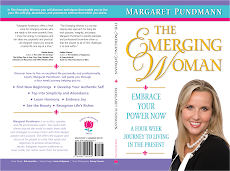Dear Friend,
You simply will not be the same person two months from now after consciously giving thanks each day for the abundance that exists in your life. And you will have set in motion an ancient spiritual law: the more you have and are grateful for, the more will be given you.
~Sarah Ban Breathnach
The impact of a "Thank You," honors the intention of the donor and the gratitude of the recipient. "Thank You" acknowledges that we've been helped through the kindness and grace of another. When we show our appreciation we honor the brilliance of another and in so doing unlock some of our own brilliance.
Famed professor, researcher, and father of positive psychology Dr. Martin Seligman, who I mentioned last week (
last week's article), asks his students to perform the following exercise: Students are asked to think of one person whom they have never properly thanked for the impact they had on their life. Next students are asked to write a short and powerful 300-word letter to this person. This essay is to be well crafted and poignant. Once the letter is in final form, students are to call and schedule some time to visit this person. At this visit the essay is to be read aloud directly to the person. Resoundingly researchers found that the students were happier people for having performed this exercise.
Dr. Seligman and his students represent one way that we can acknowledge those who have had significant impact on our lives. Other ways we can acknowledge those who have helped us:
Write a Letter with Specific Details - thanking this person specifically for what they've done in your life.
- Make a Donation of time or money in their honor to a charity near and dear to their heart
- Record a video on your computer - thanking them for what they've done for you and e-mail it to them. You could even post it to their social networking site (LinkedIn, Facebook, MySpace.)
- Throw a small party in their honor - have everyone write a short note to the honoree
- Give them a plant to grow at their desk or in their yard
- Send them a small gift that you know they would appreciate
- Or simply give a heartfelt face-to-face "Thank You"
Make It Happen
This week use your list from last week to select one person whom you desire to thank. Consider what they've done for you and include the specifics in your thank you. Remember in honoring others we honor ourselves. In thanking others we create an atmosphere of appreciation, gratitude, and abundance. In fact, if you are feeling ambitious this week why don't you select two people to honor?! Blessings to You!
Blessings to you,
Margaret.
P.S. Encourage your friends, family, and colleagues by sharing this newsletter with them and invite them to subscribe! Direct them to www.MargaretPundmann.com where they can sign up. Margaret Pundmann is a life and business coach, speaker, and author The Emerging Woman.
Please feel free to forward the "Powerful Living, Powerful You" newsletter to friends and colleagues, but please forward in its entirety. The "Powerful Living, Powerful You" newsletter is written and distributed by Emerge Enterprise. Copyright © 2008 Margaret Pundmann. All rights reserved.
www.MargaretPundmann.com.






